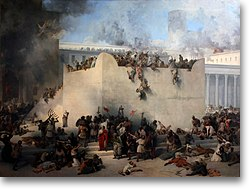-Israeli Ambassador to Panama, a member of the Druze faith, Reda Mansour, said regarding his own sharp criticism of the demeaning treatment he received by a security person when he was entering Ben-Gurion Airport.**
Front Page:
Yossi Alpher is an independent security analyst. He is the former director of the Jaffee Center for Strategic Studies at Tel Aviv University, a former senior official with the Mossad, and a former IDF intelligence officer. Views and positions expressed here are those of the writer, and do not necessarily represent APN's views and policy positions.
Tisha B'av, which commemorates the destruction of Solomon's Temple in Jerusalem and other tragedies in Jewish history, begins on sundown Saturday, August 10, and ends on sundown Sunday, August 11.
 On Tisha B’av, many Jews around the world will sit in synagogues
to read Eicha, the Book of Lamentations recited on this solemn day. The first words they
will hear will warn: “Alas! Lonely sits the city once great with people! She that was great among nations has
become like a widow” (Eicha 1:1). The city the verse refers to is Jerusalem, and more generally the
Jews of the Holy Land in the year 70 CE. It is the beginning of the story of almost 2 millennia of Jewish
exile, a period replete with significant episodes of horror and Jewish victimhood. How did the tragic scene in
this verse, and the subsequent 2000 years of exile, come to be? It was the result of senseless hatred,
tit-for-tat acts of revenge, allies turning against one another, and leaders acting for personal power without
regard for the consequences society would bear.
On Tisha B’av, many Jews around the world will sit in synagogues
to read Eicha, the Book of Lamentations recited on this solemn day. The first words they
will hear will warn: “Alas! Lonely sits the city once great with people! She that was great among nations has
become like a widow” (Eicha 1:1). The city the verse refers to is Jerusalem, and more generally the
Jews of the Holy Land in the year 70 CE. It is the beginning of the story of almost 2 millennia of Jewish
exile, a period replete with significant episodes of horror and Jewish victimhood. How did the tragic scene in
this verse, and the subsequent 2000 years of exile, come to be? It was the result of senseless hatred,
tit-for-tat acts of revenge, allies turning against one another, and leaders acting for personal power without
regard for the consequences society would bear.
The European Union issued the following statement on August 6th, 2019
Bruxelles, 06/08/2019
Israeli authorities have approved the advancement of well over 2.000 housing units in illegal settlements in the occupied West Bank. The European Union's position on Israeli settlement policy in the occupied Palestinian territory is clear and remains unchanged: all settlement activity is illegal under international law and it erodes the viability of the two-state solution and the prospects for a lasting peace.

Erez Maggor, an Israeli social scientist who specializes in the history and the political economics of the West Bank settlement, says that the impetus for the West Bank settlement policies of the Likud government in the late 1970s and 1980s is largely misunderstood.
What chiefly pushed the Israeli government to build across the Green Line, he says, was not an ideological Greater Israel zeal but rather a demand by the Likud’s low-income electoral base for affordable housing.
Maggor is a doctoral candidate at New York University’s Department of Sociology.
On June 14th 2009, Israel’s prime minister Benjamin Netanyahu gave a major policy speech at Bar Ilan University, in
which he endorsed the two-state solution. 
On its face, it was a revolutionary statement. Until then, Netanyahu was the most visibly identified Israeli politician with opposition to Palestinian statehood.
Today, ten years later, it is clear that Netanyahu’s political worldview did not undergo a metamorphosis. Rather, it was a rhetorical ploy to deflect US pressure under President Obama.
A new article by Dr. Guy Ziv of American University documents and analyzes what led up to the landmark Bar Ilan
Speech, and what happened in the past decade to Netanyahu’s stated endorsement of an idea that has always been
anathema to him.
In the face of the Trump administration's apparent abandonment of the two-state solution to the Israeli-Palestinian conflict, Americans for Peace Now (APN) urges Congress and presidential candidates to commit to supporting two states, and to reject Trump's departure from this long-held principal US policy objective.
Yossi Alpher is an independent security analyst. He is the former director of the Jaffee Center for Strategic Studies at Tel Aviv University, a former senior official with the Mossad, and a former IDF intelligence officer. Views and positions expressed here are those of the writer, and do not necessarily represent APN's views and policy positions.